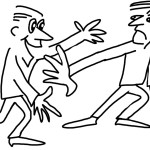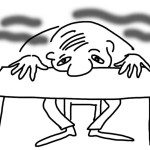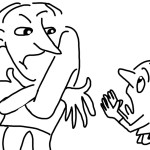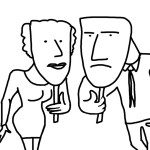Burnout is a process that develops in stages over several weeks or months – even years. One of the best-known multi-stage models was developed by a psychologist Herbert Freudenberger, who was also the first to describe the term „burnout“ in 1974 as „a state of mental and physical exhaustion caused by one’s professional life”, “a desease of over-commitment”. At each of burnout phases, different physiological and psychological symptoms and consequences are described.
Burnout phases
 Stage 1: The compulsion to prove oneself
Stage 1: The compulsion to prove oneself
- Excessive enthusiasm and ambition for work
- Appetite for action and control
- Increased expectations are turning into pressure on high performance
- Personal limitations and needs are overlooked
- Unusual willingness to take on more tasks
- Feeling happy when feeling needed
- Wanting recognition at all cost
- Everything is undertaken to get recognized
- Voluntary and/or unpaid overtime,
- Feeling of being indispensable
- Delegation considered to be time consuming and unnecessary
- Personal limitations aren’t notices any more
 Stage 3: Subtle neglect of personal needs
Stage 3: Subtle neglect of personal needs
- Having difficulties noticing own personal needs
- Diminished desire for downtime
- The ability to enjoy and feel pleasure decreases
- Loss of sexual drive and increase of partnership issues
- Increased consumption of cigarettes, alcohol and coffee, tranquilisers and stimulants
- Sleeping disorders
 Stage 4: Suppression of conflicts and personal needs
Stage 4: Suppression of conflicts and personal needs
- Forgetfulness and errors
- Loss of concentration and memory
- Delaying important tasks
- Significantly decreased ability to enjoy and feel pleasure
- Chronic fatigue, lack of energy, feeling weak
- Lack of the sense of humour
- Thoughtlessness
- Giving up hobbies
 Stage 5: Re-evaluating of values
Stage 5: Re-evaluating of values
- Increased dullness
- Failure increase despite intensive efforts
- Feeling of job meaninglessness
- Attention disturbance
- Avoiding personal contacts
 Stage 6: Increased denial of emerging problems
Stage 6: Increased denial of emerging problems
- Mishaps, attention disturbance
- Overly long breaks, failure to attend work
- Disillusionment
- Negative attitude towards work, a feeling of being exploited
- Impatience and intolerance
- Increased intake of medications.
- Feelings of disorientation, faintness
- Estrangement
- Feeling of have died inside and of inner emptiness
- Feelings of hopelessness
- Feelings of constriction, having trouble concentrating and memory issues
- Further increase of errors
- Inability to give clear instructions
- Nightmares
- Psychosomatic reactions: lowered immunity, heart palpitations, increased blood pressure, tightness in the chest, respiratory probles, muscle tension and cramps, back pain, changes in bodyweight.
 Stage 8: Obvious Behavioral Changes
Stage 8: Obvious Behavioral Changes
- Mistrust and paranoid thoughts
- Lack of flexibility
- Reduced creativity
- Decrease in social activities
- Reduction of emotional life
- Reduction of social life
- Estrangement
- Loss of feeling of oneself
- Feeling of having died inside and increasing inner emptiness
- Defensive attitude, inability to make compromises
- Inability to make judgements and decisions
- Automatisms
- Indifference, having lost access to oneself
- Increase of psychosomatic reactions
- Phobias, panic attacks
- Undefined fear and nervousness
- Feeling of insecurity and fear in the presence of other people
- Observable weakness and apathy
- Loss of courage
- Feeling that life is superficial
- Excessive clinginess to selected people, jealousy
- Avoidance to talk about work
- Negative attitude towards life and work
- Negative attitude towards life and work
- Feelings of hopelessness
- Exhaustion
- Distancing oneself from friends and relatives
- Experience of pain interchanging with experience of senselessness
- Existential despair
- Suicidal thoughts
- Hospitalisation is sometimes necessary.
 Stage 12: Burnout Syndrome – total exhaustion collapse
Stage 12: Burnout Syndrome – total exhaustion collapse
- Collapse on a mental, physical and emotional level
- Increased risk of infections
- Cardiovascular problems
- Gastrointestinal problems
- Complete performance failure
- Hospitalisation is often essential.
[post-content id=804]





